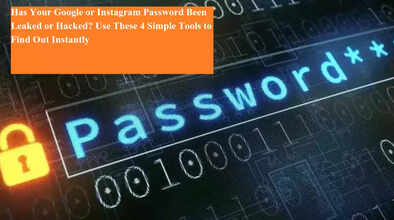Has Your Google or Instagram Password Been Leaked or Hacked? Use These 4 Simple Tools to Find Out Instantly

Introduction: Over 16 Billion Passwords Leaked Globally – Is Yours One of Them?
A recent cybersecurity report has revealed a shocking truth — more than 16 billion passwords have been leaked globally. This includes user credentials from major platforms like Google, Instagram, Facebook, and X (formerly Twitter). If you're worried about the security of your accounts, there’s no need to panic. In this article, we’ll introduce you to four trusted tools that can help you quickly verify if your data has been compromised.
1. Have I Been Pwned? – Instantly Check If Your Data Has Been Exposed
One of the most popular and reliable online tools for checking data breaches, Have I Been Pwned allows you to verify whether your personal information has been part of any known data leaks.
How it works:
-
Visit the website and enter your email address or phone number.
-
If your data has been involved in a breach, you’ll get detailed information about when and where it happened.
-
You can also check if a password has ever appeared in any known leak (without needing to enter the actual password).
This tool is free, fast, and does not compromise your security.
2. Google Chrome’s Password Manager – Smart Alerts for Saved Credentials
If you're a regular user of Google Chrome or Android devices, chances are you're already using Google’s built-in password manager. This feature helps monitor your saved passwords for strength and security.
Key Features:
-
Automatically alerts you if any saved password is weak, reused, or compromised.
-
Suggests stronger, more secure alternatives.
-
Easy to access via your Google account — no third-party app required.
This built-in security feature works silently in the background, ensuring your online presence remains secure.
3. Microsoft Edge Password Monitor – A Handy Tool for Windows Users
Windows users who browse with Microsoft Edge have access to a useful security feature called Password Monitor. This tool compares your stored passwords with known leak databases in real time.
How it helps:
-
Alerts you immediately if any of your saved passwords appear in a leak.
-
Automatically activates when you save a password in the Edge browser.
-
Seamless integration with your Windows system for added peace of mind.
It's a convenient feature for those who use Microsoft’s ecosystem for work or personal browsing.
4. Google’s Dark Web Monitoring Tool – Keep an Eye on the Dark Side
Google has launched a powerful Dark Web Monitoring feature, especially helpful for those subscribed to Google One. This tool scans dark web databases for your personal information, such as email addresses, phone numbers, and passwords.
Why it matters:
-
Notifies you instantly if your data is found on dark web marketplaces.
-
Offers detailed insights and suggestions on what to do next.
-
Available with enhanced functionality for Google One subscribers, but a basic version is also accessible to general users.
In an age where dark web leaks are increasing, this tool provides an extra layer of protection.
Why Password Security Is More Crucial Than Ever
With online fraud and hacking incidents on the rise, maintaining strong and secure passwords has become a digital necessity. Leaked credentials can lead to financial loss, identity theft, and even long-term reputational damage.
What You Should Do If Your Password Is Compromised:
-
Change your password immediately.
-
Use a strong, unique password for each account.
-
Enable Two-Factor Authentication (2FA) wherever available for enhanced security.
-
Regularly monitor your accounts for unusual activity.
Conclusion: Stay One Step Ahead of Hackers
Cybersecurity isn't just for tech experts — it's something every user should take seriously. By using these free and reliable tools, you can proactively protect your online accounts from being misused. Don’t wait for a breach to find out your data has been compromised. Check today, secure your digital identity, and spread awareness.

